Science and Its Conceptual Foundations
A series edited by David L. Hull
Sex and Death
An Introduction to Philosophy of Biology
Kim Sterelny and Paul E. Griffiths
The University of Chicago Press
Chicago and London
The University of Chicago Press, Chicago 60637
The University of Chicago Press, Ltd., London
1999 by The University of Chicago
All rights reserved. Published 1999
14 13 12 11 10 5 6 7 8
ISBN: 0-226-77303-5 (cloth)
ISBN: 0-226-77304-3 (paper)
is from W. Hennig, Phylogenetic Systematics , 1979 by the Board of Trustees of the University of Illinois. Reproduced by permission of the University of Illinois Press.
Library of Congress Cataloging-in-Publication Data
Sterelny, Kim.
Sex and death : an introduction to philosophy of biology / Kim Sterelny and Paul E. Griffiths.
p. cm. (Science and its conceptual foundations)
Includes bibliographical references (p. ) and index.
ISBN 0-226-77303-5 (cloth : alk.paper). ISBN 0-226-77304-3 (pbk.: alk. paper)
BiologyPhilosophy I. Griffiths, Paul E. II. Title. III. Series.
QH331.S82 1999
570'.1dc21
98-47555
CIP
 The paper used in this publication meets the minimum requirements of the American National Standard for Information SciencesPermanence of Paper for Printed Library Materials, ANSI Z39.48-1992.
The paper used in this publication meets the minimum requirements of the American National Standard for Information SciencesPermanence of Paper for Printed Library Materials, ANSI Z39.48-1992.
ISBN: 978-0-226-17865-3 (e-book)
to Melanie and Kate
Preface
This book began long ago and far away, in Chicago in 1993 when one of us (Sterelny) tried out the basic idea on David Hull and Susan Abrams, both of whom were supportive. On Sterelnys return to the Antipodes, he continued to think about the project, and decided that a collaborative project would be more fun to do and would result in a better book. So he talked the idea over with Griffiths and with David Braddon Mitchell, an Australian philosopher of science with interests in both philosophy of biology and Australian botany. Thus the basic body plan of the book was laid down; a body plan that, in contrast to some others, has not remained impervious to developmental and other perturbations. After a couple of years of talking, we seriously got down to writing in 1995. Since 1996 this book has probably been the main project of the two survivors, Braddon Mitchell having been submerged by other plans. He did, however, have a major input into .
There are, of course, many different ways to write an introduction to philosophy of biology. One option would be to use biological examples to stalk general issues in philosophy of sciencethe nature of theory and theory change, causation, explanation, and prediction. There is much to be said for such a book, for philosophy of science, in our view, has been too dominated by exemplars from theoretical physics. That matters: for example, the historical explanations central to, say, geology and evolutionary biology seem importantly different from those of physics. Still, that is definitely not the book we have written. This book is very much focused on the conceptual and theoretical problems generated by the agenda of biology, rather than pursuing a philosophy of science agenda through biological examples.
We have also chosen not to approach philosophy of biology by tracking the conceptual and theoretical development of evolutionary ideas, as David J. Depew and Bruce H. Weber have done in their Darwinism Evolving . There is an occasional nod to the history of the disciplines concerned, but the organizational spinal cord of our book is the conception of evolutionary biology that was developed in the classic works of Mayr, Dobzhansky, Simpson, and Stebbins in the 1940s. That conception, the modern synthesis, dominated evolutionary thinking at least into the late 1960s. The current problems of evolutionary theory have been largely, though not wholly, the result of pressures to rethink that conception. We have chosen to call this core conception the received view rather than the synthesis view because we represent it in a rather schematic and ideal form. The real synthesis was never wholly uniform, of course, and for the most part the variation within it has not been our concern.
We have called our book Sex and Death: An Introduction to Philosophy of Biology . First, the subtitle: The reader may have noticed that while it speaks of biology, in the preface we have written of evolutionary biology. Indeed, in the text we have focused on evolutionary biology. That focus is not exclusive: is devoted to exploring the interplay between evolutionary biology and ecology. But it is true that we have discussed other areas of biology mainly as they relate to evolution. So evolutionary theory and evolutionary theorists loom large over this work. (So we too can say that if we have seen too little, it is because giants have been standing on our shoulders.) This emphasis is partly, we think, a reflection of the genuinely conceptually challenging nature of evolutionary theory. As we show (we hope) in the text, evolutionary theory really poses a striking compound of conceptual and empirical problems. But it is partly a historical accident, too. We have no doubt that there are similar problems in ecology, developmental biology, and molecular biology (at least), and we hope to have done at least a little to extend the reach of philosophy of biology into those areas.
Second, the title: We chose the title because it was fun. And philosophy of biology is fun. The living world is splendid and bizarrefar more bizarre than we, at least, could have imaginedand the conceptual problems posed in understanding it are wonderfully intriguing (and important, as we argue in ). We hope this book shows that. We nurture the illusion that it will both manifest our relish in the subject and perhaps infect others with the same disease.
The structure of the book is, we hope, evident from the analytic table of contents. winds up the show. We here attempt to put the central debates about the nature of evolutionary processes and patterns in a broader context by asking whether the characteristic patterns and processes of life on earth are likely to be features of any living world.
We have tried to write a book for three audiences. We wanted a book that would be accessible both to biology students with little or no philosophy and philosophy students with little or no biology. So we have used as little technical jargon as possible. When we have used specialist terminology from either discipline we have explained it in the text (usually immediately after the terms introduction) and, often, included it in the to introduce and orient newcomers to the literature.
So we hope this book is accessible to both philosophers and biologists without previous experience of the other area. Our third intended audience is, of course, our peers. This book is not a view from nowhere. Its an introduction to philosophy of biology from our own perspective on the discipline. So it contains our own assessment of what matters and what does notof what is central and what is peripheral. That perspective is not widely shared, for we are products of a hybrid zone (displaying, we hope, hybrid vigor rather than hybrid sterility). Our take on evolution integrates important elements of the adaptationist, gene-centric conception of evolution associated with the likes of Maynard Smith, Williams, and Dawkins with elements of the pluralist, hierarchical conception associated with Gould, Lewontin, and Eldredge. At the very least, we would like to convince others in the field that the space of viable options is larger than they might have supposed.
This book took a lot of writing, and we got a lot of help with that writing. First we would like to thank David Hull and Susan Abrams for their initial enthusiasm and continued support for the project. Second, we owe a lot to the opportunity to talk biology and philosophy of biology, over many years and on many occasions, with the following: Russell Gray, Peter Godfrey-Smith, Susan Oyama, Geoff Chambers, David Hull, Karen Neander, Michael Hannah, David Braddon Mitchell, and Lenny Moss. They helped to provide the intellectual matrix from which this book has grown. Third, Peter Godfrey-Smith, Geoff Chambers, David Hull, Elliot Sober, Richard Francis, and two University of Chicago Press reviewers read and commented extensively on the semi-final manuscript. To them we owe much: thanks (not enough; if youre lucky you might get a beer as well). We thank Dan McShea, Susan Oyama, David Sloan Wilson, Alan Musgrave, James Maclaurin, Mike Dickison, Karola Stotz, Werner Callebaut, and Annemarie Jonson for reading and commenting on sizeable chunks of that same draft. We have three more specific thanks to give. First, we shamelessly borrowed, though with permission, the title of owes much to David Braddon Mitchell.
Next page
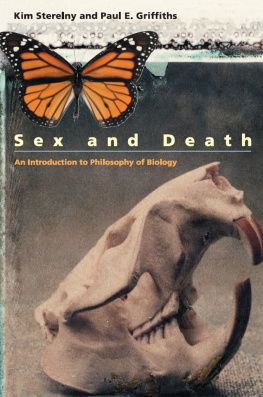

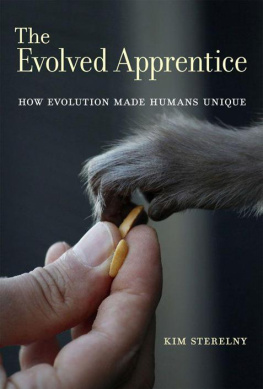
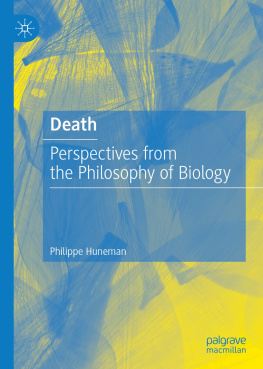

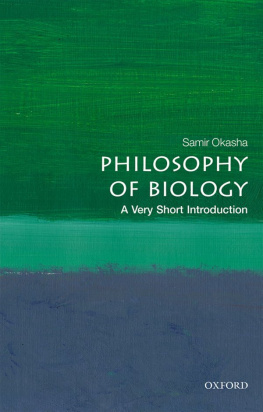
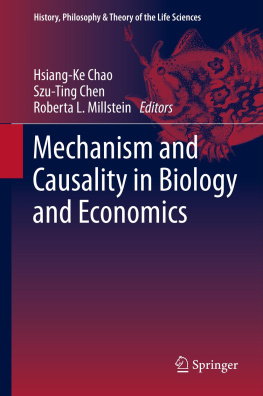
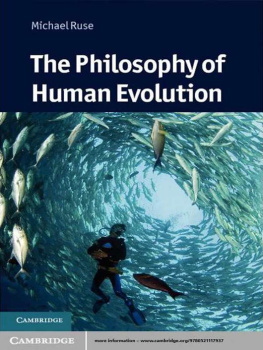
 The paper used in this publication meets the minimum requirements of the American National Standard for Information SciencesPermanence of Paper for Printed Library Materials, ANSI Z39.48-1992.
The paper used in this publication meets the minimum requirements of the American National Standard for Information SciencesPermanence of Paper for Printed Library Materials, ANSI Z39.48-1992.